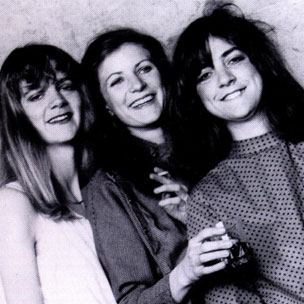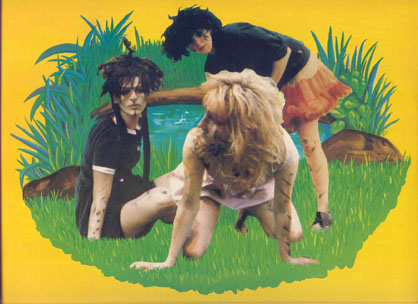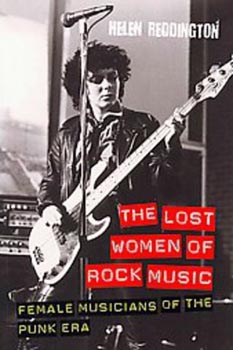REGGAE AND THE PUNK LEGACY
 |
 |
|
|
The Womens' story
By Helen McCookerybook
(March 2013)
At the core of British punk music and the punk subculture in the 1970's was the concept of subversion, and the punk women in the London punk environment who formed and joined bands exercised a double subversion: not only the subversion associated with the subculture itself, but also a subversion of sounds normally associated with 'male' music making in the pop and rock arenas.
If you listen to music by The Slits and The Raincoats, for instance, they do have their own 'sound,' with space, vocal harmonies and clear and distinctive bass-lines to the forefront. In my book The Lost Women of Rock Music: female musicians of the punk era, I explored politics, the media, gender issues and social context but not the musical legacy of punk in any detail; this article is based on a more detailed academic paper that is currently in progress, and is based in part on interviews with musicians Tessa Pollitt of The Slits and Gina Birch of The Raincoats.
It is not surprising that the female punk bands in London looked beyond the male beat-band template, because within their personnel they embodied multiculturalism; Ana Da Silva (from The Raincoats) was Portugese, Ari Up (from The Slits) was German and Paloma ('Palmolive' from The Slits and Raincoats), was Spanish; Poly Styrene from X Ray Spex had a Somali father; Ramona from the Mo-Dettes was Swiss; Rhoda Dakar from the Bodysnatchers was of mixed heritage. In the cases of Ana and Paloma, their encounters with Spanish and Portugese fascism was very close to their desire for political and social change, and drove their creative activities.
The Roxy Club, which introduced many of the punk bands to each other (and also gave many of them the first platform to perform on), was frequently cited as punks' moment of engagement with reggae because of Don Letts' tenure as DJ there. Letts identifies the film The Harder They Come, which stars Jimmy Cliff and features Toots and the Maytals on its soundtrack, as a vital cultural influence. I would add to this John Peel's championing of reggae, especially the early Bob Marley version of "I Shot the Sheriff" (which was released by Chris Blackwell's Island label in 19731) as well as the popularity of Toots and the Maytals' poppy Funky Kingston on the playlist at punk venues across the country. It was therefore a natural aesthetic progression for some male punk bands, notably The Clash and the Ruts (and other more pop-orientated artists such as the Police), to incorporate reggae influences into their music right from the beginning.
Add to this the fact that so may of these bands were based in Notting Hill where there had been a sizeable Jamaican population since the 1950's: these young people had grown up with a soundscape that included Caribbean music, and the sonic mix of The Slits and the Raincoats makes perfect sense.
It is part of normal practice in pop and rock music to be self-taught and this was no exception with the punk women musicians. However, though reggae is a genre of music not generally known for lyrics that are sympathetic to active and independent womanhood, these women were able to learn what they wanted to learn about the aesthetics of playing bass and arranging vocals from the music without taking on board the messages of the singer, and it is these sonic influences that create the distinct identities of the bands in question. So what allowed the female musicians to ignore the male-focused messages in so many reggae lyrics and enjoy the music itself?
Gina Birch of The Raincoats listened selectively; she 'heard' the message of rebellion rather than any parallel message of misogyny:
'There was an affinity with oppressed music, and it [reggae] was a relatively new music [to me]... They weren't necessarily singing all the time about 'I wanna fuck her,' which was the underlying message of a lot of rock 'n'roll... Reggae music had a different message, and we were looking for a different message: [quoting the Bob Marley/Peter Tosh song] 'Get up, stand up, stand up for your rights'
This was reiterated by Tessa Pollitt of The Slits: 'I think reggae's quite male-and-female, and rock feels male.'
It is interesting that sonically, reggae felt even-handed to both musicians. Gina continues: 'Each thing has its place. Somehow it feels egalitarian, which is what we tried to do in the Raincoats. It's like a conversation. No one sound dominates.'
When pressed to explain the anomaly of the sexism in reggae lyrics and their love for the music, Tessa explained her reasons for engaging with reggae:
'[I remember] just being really turned off by the disco music thing, I really didn't like that. I've always felt natural playing on the off-beat. I've always found that easier than playing on the beat. [Disco music was] straight- it didn't have that rebelliousness to it, the militant thing that reggae music had. Reggae is real suffering music, spiritually conscious, going back to slavery. I felt a connection with slavery; I suffered guilt for being British. We were not taught about it at school. I felt ashamed to be British; I felt compassion. The snare drum [in reggae] is like the crack of a whip, relating to slavery.'
The clarity of production in reggae allowed its listeners to identify exactly what each instrument was playing and to understand the value of a bass line and the power of the bass itself. This gave a practical 'lesson' to any aspiring bass player who might not have access to either formal or informal peer-group training. Gina says:
'When I listened to rock music, quite often I found it difficult to discern what exactly it was (that) the bass was doing, and perhaps a little boring that it didn't seem to have such an interesting role in rock music... sometimes it seemed to be very buried, whereas in reggae it was the spine, it carried a melody and a rhythm. It seemed to be the life force of reggae: the bass line and the vocals were the things that lifted me in reggae.
Unlike in rock music, there is a lot of space... between the notes and sounds. I love the space between the notes in reggae.'
Gina goes on to describe the directness of this learning method:
'When I got my bass, I listened to my current favourite reggae record at the time which was Toots and the Maytals' Funky Kingston album. And so the very first bass line that I learned was the bass line from Funky Kingston2 . It doesn't actually have many notes in it, but it was just such an uplifting tune: it just seemed to propel the song in a way that was so thrilling to me. I can't tell you how much that bass line just did it for me.
What I like doing is playing the bass on the very high strings. In "Funky Kingston,” there's the deep [section where Jackie Jackson] plays very low and then plays very high in the same pattern. I love to do that. The notes are there. Why not?'
Tessa identified other sounds that The Slits took from reggae:
'The really sharp guitar chords, the little melodies played on the guitar, the spaghetti western type melodies. The crispness of the hi-hat. The drums are very important, how can I describe them,? Not over-fussy on the drums. The clacking on the snare drum, the deadening but clacking sound. A lot of percussion, the doorbell ringing. On Cut when Dennis [Bovell, producer] shakes the matchbox and strikes it, just using everyday sounds just jumping out at you. Using sounds around you, everyday sounds just jumping out at you. The repeat and the echo effects done by the mixer.'
There were other timbral aspects that the Slits appropriated from reggae:
Tessa: "[There are] fantastic harmonies in some of the early Bob Marley songs”3 .
It was also misunderstanding of how the sounds of reggae were actually arrived at that gave The Raincoats's music one of their most distinctive aesthetic features. Gina Birch developed the vocal arrangement for the song "In Love” from the first Raincoats album by misunderstanding the way that echo and reverb were used in reggae mixes:
'When we first started, the first song that I'd written and that we recorded was called "In Love.” And at that time I didn't know about repeat echo in the studio and I didn't know how it was generated and of course I was listening to a lot of dub. So when it came to recording my song... I decided that I'd like a repeat echo but I didn't know how it was made, so I integrated that into my singing:
"IN..IN..in... in LOVE... LOVE... love... love..it's SO... SO... so... so TOUGH!”
It became more like a cry, like a signature in a way. I love the way mistakes and misunderstandings can become part of the creative journey. Ignorance is bliss.'
Consider that the Raincoats were invited to support Nirvana on tour before Kurt Cobain took his life, that The Slits were a huge and unacknowledged influence on the early persona of Madonna, and both groups (Slits, Raincoats) created sonic landscapes that can be followed through to the music of Bjork: the diversity of the music that the all-female punk bands influenced illustrates just how important marginal music-making is to our cultural development.
LISTENING
THE RAINCOATS "In Love”
TOOTS AND THE MAYTALS "Funky Kingston”
RAINCOATS "Fairytale in the Supermarket”
THE SLITS "Typical Girls”
BOB MARLEY "I Shot the Sheriff”
ERIC CLAPTON "I Shot the Sheriff”
FOOTNOTES
1) Made a hit in the US and UK by Eric Clapton in 1974.
2) Released in 1973 in the UK
3) A comparison between Marley's and Clapton's versions of 'I Shot the Sheriff' demonstrates difference in clarity of mixing between the two tracks. Although Marley's was mixed and part-recorded in London's Basing Street Studios, the engineers there were aware of the distinct differences between mainstream and reggae production values (see Sound on Sound, March 2006).
